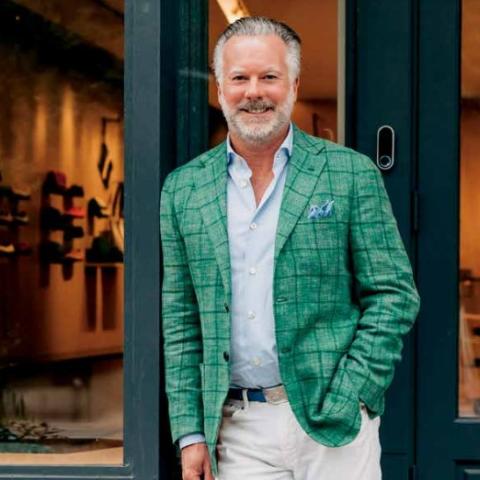Stephen Hawthornthwaite ’92 has long been a fan of footwear — especially women’s shoes. While courting his wife-to-be Erin, his first gift to her was a pair of strappy heels. That came a decade before he embarked on an entrepreneurial journey in fashion, making women’s shoes that are stylish, comfortable and knit with recycled plastic thread created from single-use bottles and ocean trash.With his partner Roth Martin, Hawthornthwaite worked to create a sustainable business from the ground up, long before the fashion industry embraced this mindset.
Rothy’s shoes were made for women on the go, without the heels — be it to the yoga studio, dropping the kids off at school or heading out for a night on the town. In this past year, he added men’s and children’s footwear.
“Casualization is a trend that’s been unfolding for many years,” said Hawthornthwaite, 52, of San Francisco. “Women were wearing leggings all the time, but what struck us was that there wasn’t a good shoe choice to go with that. Our vision was for a front-of-the-closet shoe that was easy and fun.”

-Stephen Hawthornthwaite
Raised in Greenville, South Carolina, Hawthornthwaite arrived at Duke in the late 1980s, uncertain of his direction. He immersed himself in the liberal arts, majoring in political science while feeding his curiosity about
the world with courses in oceanography, art history and the French language. He also found time to hang out at Sarah P. Duke Gardens, the Cambridge Inn and the Sigma Alpha Epsilon fraternity house.
Hawthornthwaite had an inkling that he’d someday enjoy owning a company, but he hadn’t a clue about how to make that happen. “Duke was my opportunity to explore,” he says. “I always envisioned myself owning a company, but was never quite clear what the path would be.”
He went to law school at Wake Forest, worked on mergers and acquisitions on Wall Street, and later moved to tech and e-commerce firms in San Francisco. By the early 2010s, he and Martin, a designer, made the leap into women’s shoes. It was a business where both had plenty to learn.
“To really succeed, we had to innovate, otherwise it was just a branding exercise to convince buyers that our shoes were cooler,” he said.
They first explored the footwear manufacturing industry in China, discovered the wasteful nature of 21st century shoe manufacturing, and decided to start with a shoe factory in Maine to test their vision. But the U.S. supply chain for footwear was so compromised that Rothy’s returned to China to build its own factory and design 3D knitting machines that limit waste during production.
Hawthornthwaite was dogged, spending four years in research and development before the brand was launched. “It was an iterative process, with a lot of failure along the way,” he said. “We were building from scratch, and had an opportunity to build an entire brand, based on sustainability.”
They launched the brand online in 2016, and the first Rothy’s store opened in San Francisco two years later. Today there are 12 Rothy’s stores, including four new retail shops that opened in 2022. And to date, Rothy’s has turned more than 125 million single-use bottles and 200 tons of marine plastic into shoes, handbags and accessories.
The circle of Rothy’s wearers is expected to grow dramatically next year, following the purchase of 49 percent of the company by the Brazilian footwear giant Alpargatas, whose popular brand of open-toe footwear called Havaianas are sold in stores in 130 countries.
As his business continues to expand, Hawthornthwaite remains a shoe lover. When he heads to the office, he dons a pair of his own driving loafers in Desert Camo, which he finds in the front of his closet.
“Men are interested in comfort, too,” says Hawthornthwaite. “They want to look good when they’re out in the working world.”